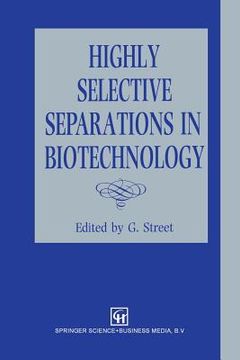Share
Highly Selective Separations in Biotechnology
Street, G. (Author)
·
Springer
· Paperback
Highly Selective Separations in Biotechnology - Street, G.
Choose the list to add your product or create one New List
✓ Product added successfully to the Wishlist.
Go to My Wishlists
Origin: U.S.A.
(Import costs included in the price)
It will be shipped from our warehouse between
Friday, July 19 and
Friday, July 26.
You will receive it anywhere in United Kingdom between 1 and 3 business days after shipment.
Synopsis "Highly Selective Separations in Biotechnology"
Success in meeting the challenge to produce the commercial products anticipated by the exploitation of biological processes depends upon provid- ing effective separation protocols. Effectiveness can be measured in terms of selectivity, purity, resolution and validatory success. The major processing problems are associated with either the selective recovery of molecules which are present in low concentrations from complex mixtures or the selective removal of contaminants from the desired molecule. Central to the evolution of processes satisfying this demand are the regulatory requirements being imposed by governments on the purity of a product, especially in the health care market. Synthetic organic chemists are increasingly finding it advantageous to conduct one or more steps using either enzymic biotransformations where molecules with a single and consistent stereochemistry or chirality are required. The underlying princi- ples behind the methods, techniques and processes currently being used and developed commercially rely upon the biospecific nature and properties of the desired molecule. When these factors are married to the more traditional techniques of precipitation, chromatography, liquid-liquid extraction and membrane processes, powerful tools emerge, allowing highly selective separations to be designed. The logical extension of these combinations is to apply genetic engineering techniques to influence the separations at a more fundamental and structural level by modifying the target protein at source, during its synthesis, to facilitate its separation in a given, selective manner, leading to the distinct possibility of producing 'designer' separation programmes.
- 0% (0)
- 0% (0)
- 0% (0)
- 0% (0)
- 0% (0)
All books in our catalog are Original.
The book is written in English.
The binding of this edition is Paperback.
✓ Producto agregado correctamente al carro, Ir a Pagar.

